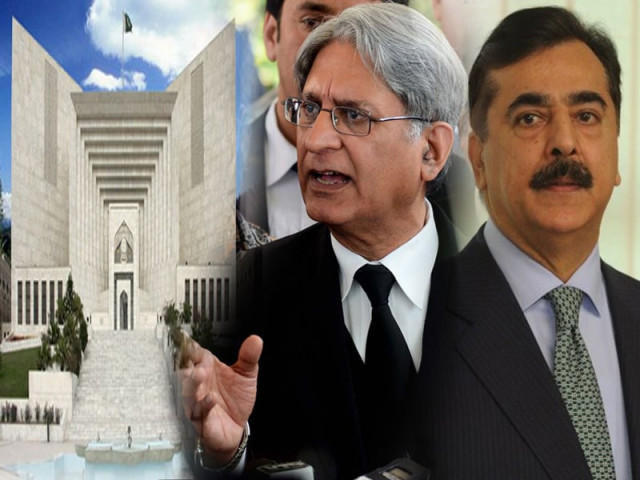Contempt case: SC asks Aitzaz to conclude arguments by Wednesday
PM Gilani’s counsel raises objections, says trial is ‘unfair’.

During Tuesday’s hearing of a contempt of court case against the prime minister, a seven-member bench of the apex court, headed by Justice Nasirul Mulk, told Aitzaz Ahsan that 10 days to discuss Article 10-A was enough.
Justice Ejaz Chaudhry observed that many others were suffering due to this case, and added that the court would not give any more unnecessary time.
A displeased Aitzaz told the court he had no problem with whatever the court wanted to do – without his consent.
In response, Justice Mulk told Aitzaz that without his consent, the court will ask him conclude his arguments on Wednesday.
The premier’s counsel, however, replied that he cannot curtail his arguments. “I did hard work and conducted a research for preparation of the case to assist the court on this matter and I did not promise to conclude my arguments by Wednesday,” he said. He also told the court that he too was suffering due to the case.
Aitzaz further said that the court had asked him questions to begin with; so, should he not reply. Justice Mulk replied: “Go ahead, we will not ask you any question.” The premier’s counsel raised objections and said that then it would not be a fair trial.
“Should I not read evidences before the court in my defence?” Aitzaz said.
The court offered him extra time for Tuesday and Wednesday but he refused the offer, saying that it was not possible for him to argue for over three hours a day.
Earlier during proceedings, the premier’s counsel advised the bench to refer the issue to parliament for necessary action, as after the induction of article 10-A in the Constitution the relevant law of the contempt of court became void and irrelevant.
Aitzaz insisted that if there is a flaw/shortcoming in any law, the court refers the matter to parliament.
He referred to Article 175-A, inserted in the Constitution as a result of the 18th Amendment, which was referred back to parliament to remove a flaw in it, which was done so in the 19th Amendment.


















COMMENTS
Comments are moderated and generally will be posted if they are on-topic and not abusive.
For more information, please see our Comments FAQ